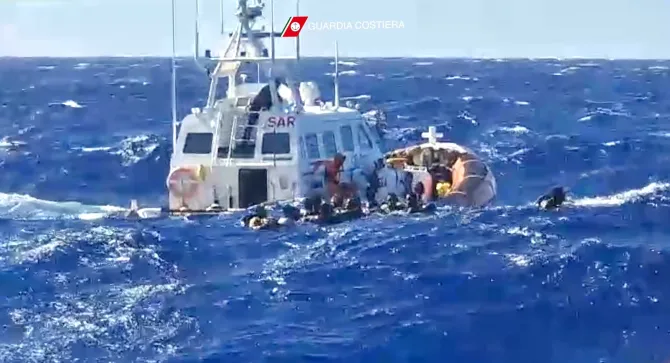- A woman and a child have been identified as those who have died
The Italian coastguard says 57 people were rescued
The coastguard said two boats had run into trouble off the southern Italian island of Lampedusa on Sunday, adding that 57 people had been rescued.
In a separate operation, 34 migrants were airlifted by helicopter from a cliff in Lampedusa on which they had been stranded since late Friday following another shipwreck, the Italian mountain rescue service said.

A child and two pregnant women were among them, it added.
Italy is experiencing a surge in sea migration, with almost 92,000 arrivals so far this year, according to interior ministry data as of Friday, compared with around 43,000 in the same period in 2022.
READ MORE: Titanic expert believes TOURIST VISITS WILL RESUME despite tragic deaths of five on OceanGate Titan
The coastguard said they carried out a ‘complex’ rescue south of Lampedusa on Saturday, picking up the passengers of two sunken migrant boats that had probably set off from Tunisia’s Sfax, a hot spot in the migration crisis there.
In a statement, the coastguard described the two dead migrants as a woman and a child.

Italy’s Ansa news agency earlier identified them as a mother and one-year-old child from the Ivory Coast.
Ansa cited survivors as saying one vessel was carrying 48 people and the second 42.Survivors and bodies were picked up 23 nautical miles south-west of Lampedusa, it said.
The shipwrecks happened in very rough seas.
More than 2,000 people have arrived in Lampedusa in the last few days after being rescued at sea by Italian patrol boats and NGO groups amid strong winds around the island.
On Sunday, Spanish NGO group Open Arms said it was finally allowed to disembark 195 rescued migrants in the southern Italian port of Brindisi, after more than two days of sailing in rough seas.
Italy’s government has a policy of assigning far-away ports to charity ships, rather than letting them disembark migrants in Lampedusa or Sicily, with the aim of spreading arrivals across the country.
NGOs say this increases their navigation costs, prolongs the misery of survivors, and reduces the amount of time charity ships can patrol areas of the Mediterranean where shipwrecks are more common.












